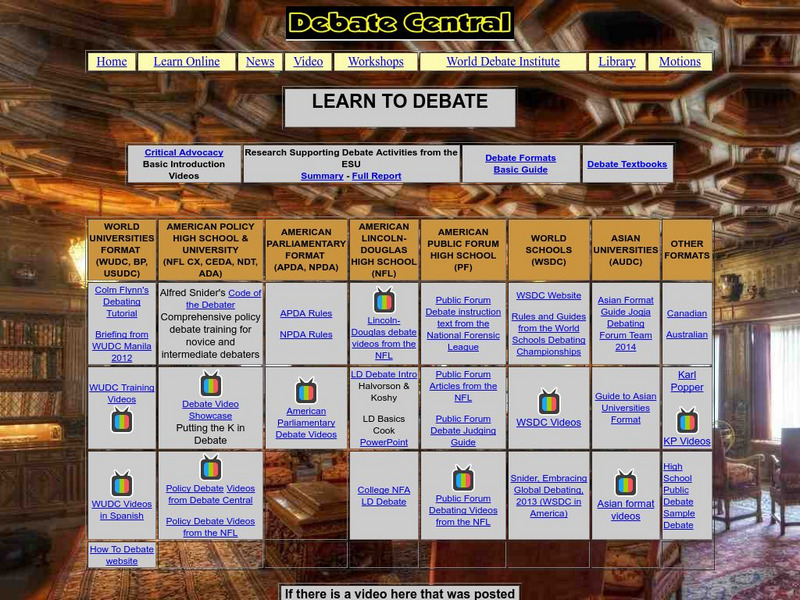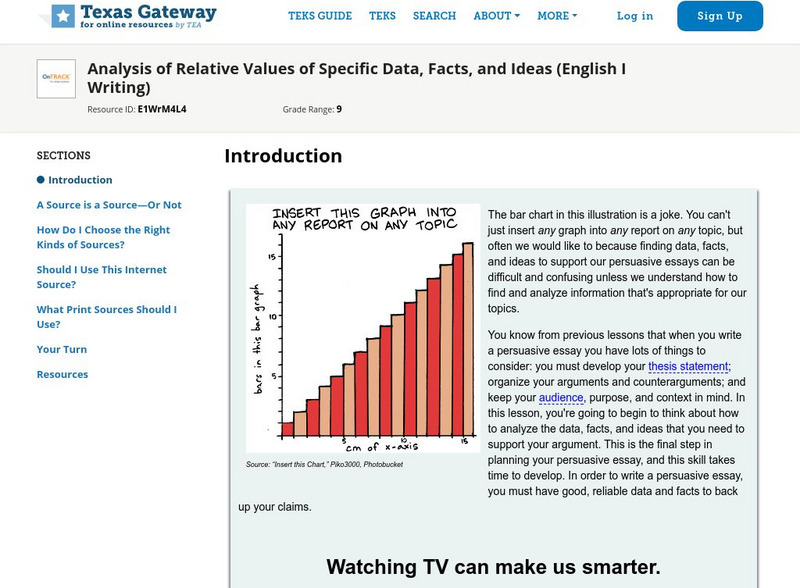Southern Nevada Regional Professional Development Program
Was Bias A Factor? Make an Argument
The ability to analyze an argument is a skill emphasized by the Common Core standards. Offer your class an opportunity to develop and hone their skills by providing them the testimonies in an Oregon court case. After reading the facts of...
Curated OER
Fact and Opinion: How to Tell the Difference
Young scholars explore reasoning by completing a worksheet activity in class. In this fact vs. opinion lesson, students identify the differences between a personal opinion and something that is factually true. Young scholars identify...
Curated OER
Argumentation and Logic
Students recognize inductive and deductive reasoning and analyze common fallacies in critical thinking. In this argumentation and logic lesson, students use role playing activities and specific instances of inductive and deductive...
University of Glasgow
University of Glasgow: Critical Reviews
This site is designed to be used by psychology students at the university level, but it provides helpful instruction for anyone writing critical reviews of non-fiction. Instruction includes everything from how to be critical to...
Other
Urban Debate Leagues: Learn to Debate
Wide, broad site offering a wealth of resources for beginning debaters. Includes links to videos (requiring RealPlayer). There is a link to the basics of argumentation as well.
PBS
Pbs Learning Media: Common Core Mathematics: Argumentation and Review
Educators will hear experiences of other professionals with opinions of the value of the Common Core Mathematics focusing on argumentation and review in the classroom.
PBS
Pbs Learning Media: Ideas in Action: Visit Other Classrooms
Teachers address the practice of visiting other classrooms to observe student argumentation and criticism in mathematics. [1:19]
Georgia Department of Education
Ga Virtual Learning: Types of Writing: Expository and Persuasive
This lesson introduces two types of writing: expository and persuasive. It defines and provides examples of each kind. It offers links to MLA Formatting and Style Guide and sample papers of opinion and exository essays.
Texas Education Agency
Texas Gateway: Analysis of Relative Values of Specific Data, Facts, and Ideas
[Accessible by TX Educators. Free Registration/Login Required] This lesson focuses on analyzing and evaluating the value of the sources used for evidence in a research project.
University of California
South Coast Science Project: Mimicking Plants and Animals Lesson Plan
In this lesson, students are challenged to think about external features that animals and plants have that humans have copied. Students then apply their engineering skills to design a jacket. In addition, this activity introduces the...
iCivics
I Civics: Games: Argument Wars
Games in which players act as lawyers arguing head to head before a judge about real Supreme Court cases.
Sophia Learning
Sophia: Elements of an Effective Argument
Discussion focuses on understanding the three academic language objectives that make an effective argument: understand the concept of a thesis statement, the significance of writing an argument with an audience in mind, and the...
Other
Bloomsburg University: Lincoln Douglas and Team Debate Formats
Dr. Tomlinson provides basic outlines of the two most prominent debate formats including time limits and the characteristics of each phase of the debate.
Fun Trivia
Fun Trivia: The Four Types of Writing Trivia Quiz
A fifteen-question quiz in which the reader identifies a type of writing for each situation: argumentation, exposition, narrative, or description. Correct answers are displayed once answers are submitted.













